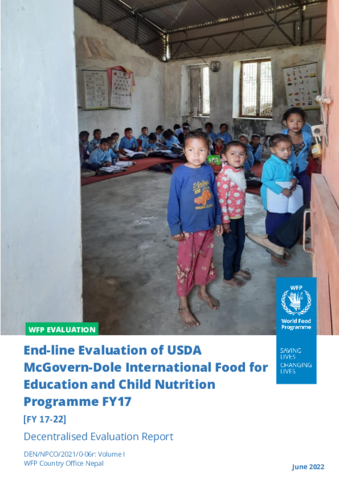
This decentralized evaluation was commissioned by the WFP Nepal Country Office and covers the End-line Evaluation of USDA McGovern-Dole International Food for Education and Child Nutrition Programme Fiscal Year 2017 [2017-2022]. It was carried out between November 2021 and May 2022.
The evaluation was commissioned to i) assess the change that has been created by the programme since its inception (ii) produce sufficient evidence to show how the programme has performed against its overall objective. It was intended for both accountability and learning purposes. It focused on assessing relevance, effectiveness, efficiency, coherence, impact, and sustainability. Overarching evaluation questions included:
- The extent to which the intervention objectives and design respond to beneficiaries, global, country and partner/institution needs, policies, and priorities in changing circumstances
- The compatibility of the intervention with other interventions
- The extent to which the intervention achieved its objectives and its results, including any differential results across groups in the three provinces of Lumbini, Sudurpaschim and Karnali.
- The extent to which the intervention delivers results in an economic and timely way,
- The extent to which the intervention has generated or is expected to generate positive or negative, intended or unintended, higher-level effects, and
- The extent to which the net benefits of the intervention continue or are likely to continue.
Key evaluation findings included:
The project providing regular and fortified school meals proved highly relevant to government plans and to address access related food insecurity in the targeted regions. The programme’s focus on gender and social inclusion in implementation address the entrenched gender inequality and social exclusion in Nepalese society. The evaluation reveals the setbacks faced by the programme due to COVID-19 related lockdowns. While enrolment and attendance in schools have witnessed a decline, the resilience created by the programme gets demonstrated through the lower decline. Despite reduced attendance, student attentiveness is seen to have increased over baseline. The government has recognised the positive impact of the School Meals Programme’s efforts towards increasing education and health outcomes of school going children. While the continuation of School meals programme is cemented by policy, the implementation of the same is expected to be meet with some challenges. The WASH intervention has facilitated the process of improving sanitation behaviour and hygiene practices among students. The change in Nepal’s governance structure has created foreseeable challenges. Some institutional changes and dynamics could adversely affect the institutionalisation of inter-governmental relations, thereby affecting the sustainability of development programmes.
Key recommendations from the evaluation included:
Strategically engage with different ministries for better convergence of department objectives and activities to ensure sustainability of impact. Focus WFP efforts on building capacities of local level actors, developing market linkages, and enhancing supply chain governance for the effective functioning of the SMP to ease management of food. Advocate for streamlining of roles and responsibilities for monitoring and implementation between federal, provincial, and local level to establish clarity of roles between governance levels Advocacy efforts towards increasing per student/per meal budget allocated to schools is needed as the programme transitions from in-kind to cash modality. Strengthen the approach, objectives, and goals of WFP to supporting the government’s strategy for taking over the school meals programme.
.
